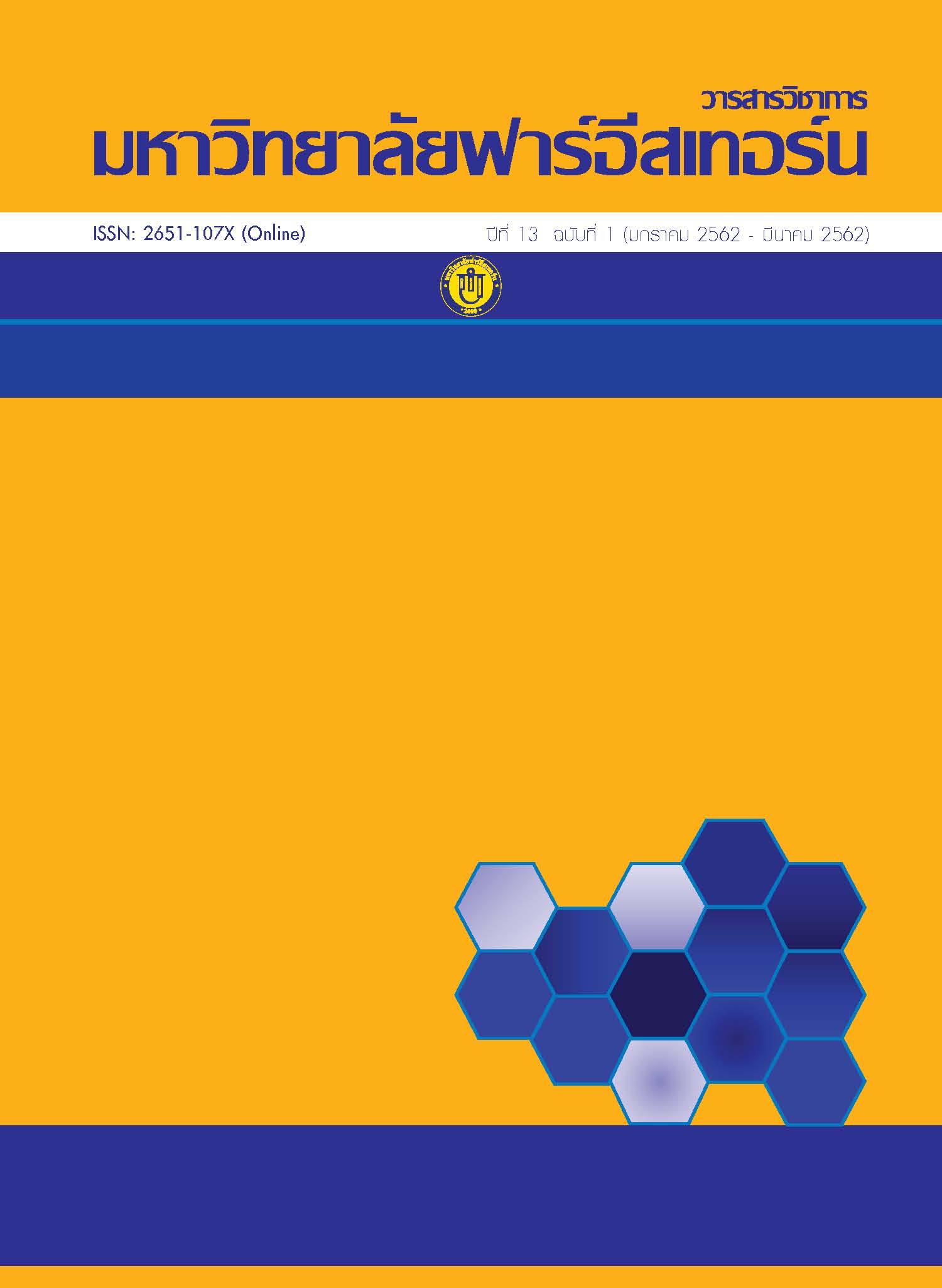Setting up the Independent Study of the Undergraduate Students in the “Institutions and Economic Systems” Course
Main Article Content
Abstract
The objective of this research was aimed 1) to examine problems and obstacles in learning and the needs for student activities, method for setting up the independent study and 2) to compare learning outcomes between traditional learning and independent study of the undergraduate students in the ‘Institutions and Economic Systems’ course. The questionnaires were used as a research instrument, enquiring the respondent’s opinion about problems and obstacles in learning and the needs for student activities. The sample included the undergraduate students who had ever enrolled in the Institutions and Economic Systems’ subject, a total of 98 people during 2015 - 2016. The results are expected that it would be further developed according to the planned course goals. The quasi-experimental research was adopted. The students’ learning outcomes between traditional learning and independent study were compared. The samples were divided into two groups; each group of 15 subjects, who have never enrolled the Institutions and Economic Systems’ course. In data analysis, the statistics implemented included percentage, mean and standard deviation.
The results demonstrated the problems and obstacles and the need for student activities; excessive lecture hours (92 percent), and lack of practice in courses for sure of clearer concepts (89 percent), and a desire to widen the knowledge gained from lectures
(76 percent), the number of activities should be increased to gain more new knowledge
(69 percent), method for setting up the independent study to achieve the planned course goals and the required learning through lecture represented 22.5 hours, and the remaining of 22.5 hours for independent study, independents study outside the classroom included 40 hours. The learning outcomes of the students given the independent study represented an average of 2.78 (M = 2.78, SD = 0.45) at fair satisfaction level, higher than traditional learning outcomes; an average of 1.97 (M = 1.97, SD = 0.52), at less satisfaction level.
Article Details
1. Any views and comments in the Journal of Social Innovation and Lifelong Learning are the authors’ views. The editorial staff have not to agree with those views and it is not considered as the editorial’s responsibility.
2. The responsibility of content and draft check of each article belongs to each author. In case, there is any lawsuit about copyright infringement. It is considered as the authors’ sole responsibility.
3. The article copyright belonging to the authors and The Far Eastern University are copyrighted legally. Republication must be received direct permission from the authors and The Far Eastern University in written form.
References
school . 10,9-12
Andreev, V.I.(2013) Pedagogical management of independent work of students at the
present stage. Methodical recommendations for teachers.Kazan':KGU im. V.I
Ul'yanova- Lenina.
Bashkova N.P., Merzlyakova L.V.(2009) Forms of quality control of independent work
Dents. Savelieva MG. (ed.) Independent work of students: models,
experience,technology. Izhevsk: Udmurt University,45-50.
Golovina ,N.I.(2016) Project technologies in the independent work of students .Retrieved
on June,12,2016,fromhttps://festival.1september.ru/articles/506041
Kulzhanov Z.B., Kulzhanova Z.Z.(2012) Peculiarities of organization of independent
work of students under the conditions of credit system of training
Personality, family and society: issues of pedagogy and psychology: Sat. Art.
by mater. XVI Intern. scientific-practical. Conf. Part I. - Novosibirsk: SibAK.
Retrieved on June,12,2016,from https://sibac.info/conf/pedagog/xvi/28216
Murav'eva,N.V.(2013) Independent work of students –certificates in the conditions of
information-training environment: Authorthesis. ped. nauk .Ekaterinburg.
Petuhova ,T.P., Glotova ,M.I.(2008) Independent work of students as a meands of
development of information competence . Higher education in Russia.12,121-
126.
Pidkasistyj, P.I. (2005) Organization of educational and cognitive activity of students. 2
ed., Ext. and peo-ref. M.: The Pedagogical Society of Russia.
Rosina, N.(2006) Organization of independent work of students in the context of innovative
training.Higher education in Russia,109-115.
Senashenko V., Zhelnina N.(2006) Independent work of students: actual problems .Higher
education in Russia.7, 103-109
Vavilina A.V.(2012) Competence approach in education . New educational standards of the
higher school: traditions and innovations. A collection of scientific articles of the
All-Russian (with inter-junior) scientific and practical conference. Ed. E.G. Elina,
E.I. Balakirevoy. Saratov,24-27

